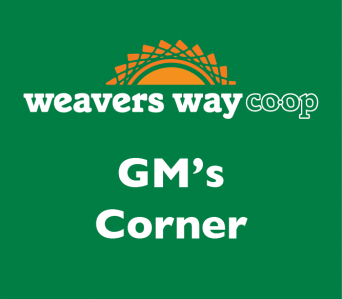
GM's Corner: Can a Person Get a Drink Around Here? Nope, Not Yet

OPEN MEMBER FORUM
Wednesday, June 21, 6-7 p.m. Community Room, 555 Carpenter Lane
Got questions, concerns or ideas about your cooperatively owned business? Bring them to the table with General Manager Jon Roesser, staff and Board members and other member-owners. Click for info and to RSVP.
On Nov. 29, 1933, four days before the end of Prohibition, the PLCB — that’s the Pennsylvania Liquor Control Board — was born. Its purpose, declared Gov. Gifford Pinchot, was to “discourage the purchase of alcoholic beverages by making it as inconvenient and expensive as possible.”
True to its mission, the PCLB did a fine job of making the purchase of alcohol inconvenient and expensive, but Pennsylvanians have persevered.
I can remember when I was a kid going to the State Store with my dad. The booze was lined up on rows of gunmetal shelves in the back, behind a counter manned by the meanest SOBs you’d ever meet. Dad wrote what he wanted on a form and, at a snail’s pace, they’d go fetch it. Liquor was a vice and it was treated as such.
Well, those days are long gone. Over the last few decades, State Stores became “Wine & Spirits Shops,” then “Fine Wine & Good Spirits” stores — still state-run, but customers can at least fondle the bottles before buying. Service is much improved and we can count on things like temperature-controlled rooms for the good stuff, experts on staff, even tastings. Gifford Pinchot is spinning in his grave.
But the sale of liquor remains under the careful control of the state. In recent years however, things have started to loosen up. Bipartisan support for reform has led to rule changes that are resulting in alcohol now being sold in gas stations and grocery stores. It’s not simple, but here’s the current landscape:
Hard liquor is only available in the state-run stores. You can buy wine in the state-run stores too, as much as you want. Wine is now also available in some grocery and convenience stores, but only those with a PLCB restaurant liquor license, and there’s a four bottle maximum and a separate checkout. At these grocery and convenience stores, you can also buy beer, but only six-packs, and there’s a two six-pack maximum. Some restaurants, bars and delis have a PLCB deli liquor license that allows them to sell you six-packs of beer, but not wine. If you want to buy a case or more of beer, you have to go to a beer distributor (who, by the way, can’t break or mix a case for you).
I think that’s right, though by the time you read this things may have changed further. The current rules are indeed confusing, but this confusion is suggestive of the change that’s in the air. It’s a good bet we’ll see more changes in the next few years, particularly when it comes to beer and wine. (The smart money is on the state keeping its lock on hard liquor.)
Whether or not you think these changes are for the better (both sides have good arguments), it’s going to be hard to get this genie back in the bottle. And this will have consequences for the grocery business and thus for the Co-op.
While the old rules may have been vexing for consumers, from a grocer’s perspective they ensured a level playing field. Grocery stores didn’t sell booze, period.
Now, grocers with coveted PLCB licenses have a state-issued competitive advantage. And while anyone can apply for a PLCB license, they are sold on the open market to the highest bidder. So the deep-pocketed, for-profit chains are snatching them up at prices that effectively box out the little guys.
Giant, the, um, giant supermarket chain, has spent over $6 million for 19 licenses, including a record-breaking $526,000 for one in Montgomery County. (PLCB licenses are county-specific and cannot be transferred outside the county where they’re designated.)
Sheetz — Altoona, PA’s answer to Wawa — has scooped up 32 licenses to sell beer and wine at its convenience stores. Whole Foods, Acme, Wegmans and Fresh Grocer are all getting into the game.
So the problem is that the state is creating (I’d like to think unintentionally) an unfair advantage for big chains, who can plunk down a few hundred thousand for a PLCB license with a shrug. Smaller independent grocers get priced out.
Ideally, from the Co-op’s perspective, the ongoing changes to Pennsylvania’s liquor laws will lead to a new license classification, one specifically for grocery stores and one that isn’t prohibitively priced. At least, that would be fair.
Of course, then we’d have to figure out where to put the stuff. We may need a third floor in Mt. Airy.
See you around the Co-op.
